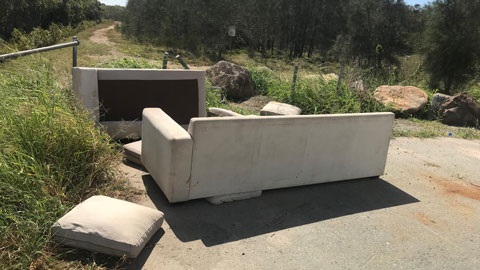Litter and illegal dumping

Littering and illegal dumping pollute our environment. It lessens the amenity of our public spaces, deterring visitors and encouraging other illegal and antisocial behaviour. It poses potential harm to human and wildlife health, particularly when dangerous materials like sharps, asbestos or toxicants are dumped. It accumulates in our waterways and interferes with our stormwater drainage infrastructure.
Instances of littering and illegal dumping can attract significant on-the-spot fines.
Littering
Littering is the unlawful deposit of any type of waste material less than 200 litres (approximately the size of a wheelie bin) in volume. The most commonly littered items include:
- cigarette butts
- drink bottles
- fast food packaging
- food scraps
- fishing tackle.
Dangerous littering can cause harm to people, property and the environment. Dangerous littering includes:
- lit cigarette butts
- needles and clinical waste
- broken glass or other sharps.
Avoid littering by:
- carrying waste on your person or in your vehicle until you can access a bin
- using a reusable pocket ashtray
- covering and securing vehicle and trailer loads
- reporting broken kerbside bins to Council, or requesting a larger bin if required via waste collection services.
Illegal dumping
Illegal dumping is the unlawful deposit of any type of waste material greater than 200 litres (approximately the size of a wheelie bin) in volume. Common illegally dumped items include:
- household rubbish
- household goods (such as appliances, furniture etc)
- green waste
- building waste
- tyres, chemical drums and paint tins.
Eligible City of Moreton Bay residents, ratepayers, charitable organisation, and community groups are entitled to free disposal of general waste. For more information on eligibility, waste facility locations, and conditions of use, visit waste and recycling services.
Penalties
Under the Waste Reduction and Recycling Act 2011, it is an offence for a person to unlawfully deposit waste. A full list of the offences and penalties can be found on the Queensland Government website.
The Act identifies litter and illegal dumping offences as:
- littering under 200L, including littering from a vehicle or vessel
- dangerous littering under 200L
- illegal dumping—200L or more, to less than 2500L
- illegal dumping—2500L and over.
Reporting littering and illegal dumping
Report littering or illegal dumping by downloading the Snap Send Solve app or report online. Do not disturb or scavenge through the deposited material, as this may compromise future investigations and pose a risk to your health.
Under Queensland’s Waste Reduction and Recycling Act 2011, anyone who observes littering or illegal dumping from a registered vehicle or vessel may report the incident to the Department of Environment and Science via the online littering and illegal dumping reporting form or by email to illegaldumping@des.qld.gov.au. You can also call 13 QGOV (13 74 68) to get a hardcopy of the online reporting form sent to you. Do not:
- approach the vehicle or individuals who are littering or illegal dumping
- disturb the deposited material after the incident.
What else can I do?
- Buy your own special reusable water and hot drink containers, bags, food utensils; and gift reusable items for family and friends.
- Talk with family and friends about the impact of inappropriate disposal of material on our environment.
- Request a waste education workshop from Council regarding the impact of litter and illegal dumping, the current deterrents and successful programs.
- Register with Council for Clean Up Australia Day or for a local litter clean-up of a public area in the Moreton Bay region anytime during the year.